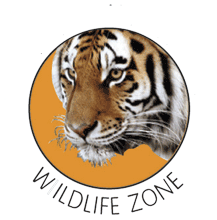THE HISTORY OF FES AND THE WZ
The Foundation for Endangered Species (FES) and the Wildlife Zone (WZ) have intertwined histories as the WZ is the supportive charity to FES. Trustees and permanent volunteers are similar for both charities.
We have done many other things, but here is a sample of what we have succeeded in nearly 20 years.
THE UNITED NATIONS’ GROUPS
THE EARTH CHARTER INTERNATIONAL

Andy Mydellton endorsed the Earth Charter and was the FES delegate to the Earth Charter + 5 Conference at Amsterdam in November 2005. As a result of that conference, FES and the Wildlife Zone built its programmes and media activities on many of the relevant Earth Charter principles. Raising Awareness of all environmental and wildlife issues is paramount, as is educating the next generation.
This is because if the world is to escape the Mass Extinction of the Species, then the next generation will probably be the ones to do it. FES still helps in these matters, and continues their commitment to the Earth Charter International and its activities with the most appropriate United Nations organisations.
On our only ‘time off’ from formal seminars in the Earth Charter + 5 meeting, most of us went to the Anne Frank museum in Amsterdam, This was an ‘eye opener’ and something which we would continue with in later years when we set up our Survival Against the Odds exhibitioned theme.
The Foundation for Endangered Species helped transformative education with long term changes. In turn this will lead to sustainable living mind-sets. We continue to use the Earth Charter as a framework for our educational activities, especially through the media.
The Earth Charter has defined sustainability as "environmental practices that value and sustain biodiversity and life-supporting ecological processes" where society, the environment and the economy are interconnected.
United Nations Decade of Education for Sustainable Development or
UNDESD

In 2002 UNESCO declared that UNDESD would start in 2005 and that Earth Charter International would be the enforcer.
FES also facilitated the Decade of Education for Sustainable Development (UNDESD) and post UNDESD projects. Changing mind-sets is ultimately the way to solve so many environmental and wildlife problems.
The link to the Earth Charter International is
FES was facilitating and enhancing the UNDESD initiative from its inception, but they joined arguably the most important UN organisation shortly afterwards. In 2007 they began working within the UNESCO UK ASPnet and took on a more formal educational role.
FES has been a member of United Nations Educational, Scientific and Cultural Organisation Associated Schools Project Network (UNESCO ASPnet) for over 14 years, and with Andy Mydellton later becoming its chairman. Unfortunately it has been mothballed recently due to lack of government funding. However Andy still continues on UK’s UNESCO Panel of Experts and is ready to help the committee when it reforms.
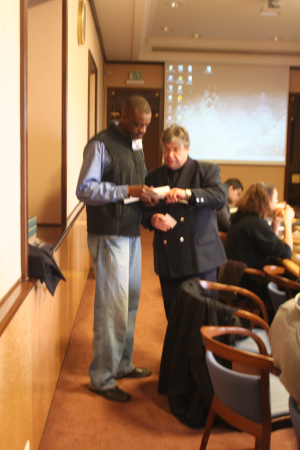 |
| Ron Bishop helps out at one of the seminars |
Because he was a college lecturer, Andy has given lessons, presentations, and has taken meetings and assemblies in schools. These were to help raise awareness of the different UN roles for educating younger people and environmental problems, including endangered wildlife. He has also made a number of photographic exhibitions on behalf of UNESCO in schools and libraries.
The charity also took part in some UNESCO seminars at the United Nations Palace at Geneva. As well as these week long set of meetings we also held talks at the headquarters of the United Nations Environmental programme (UNEP) also in Geneva, and the International Union of Conservationists and Nature (IUCN) at nearby Glands.
Since then Andy Mydellton has taken part in another seminar at the UN General Assembly in New York and paid a diplomatic visit to the nearby American UNESCO offices.
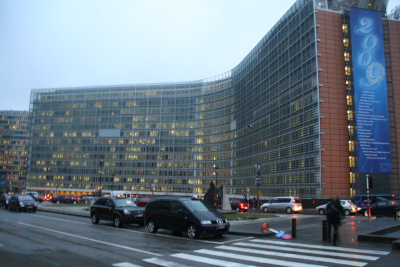 |
| European Parliament |
The European Parliament
We took part in some Sustainable Living debates in the European Parliament at Brussels. This put FES and the WZ on a firm standing throughout the continent and elsewhere. As well as formal debates in the chamber, we also had more informal talks and made contacts with like-minded delegates whenever possible.
Most if not all of these issues are still relevant today and now seem ordinary things to do. One example is recycling, not only as individuals, but also with council led community and neighbourhood policies.
It also reinforced our commitment to the Earth Charter principles which we had signed up to some years before.
Activities In the UK
All Party Parliamentary Climate Change Group (APPCCG)
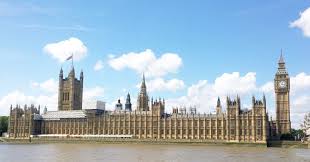 |
| Houses of Parliament |
We felt that the APPCCG’s agenda suited the Wildlife Zones interests in the wider remit than FES and its immediate wildlife priorities. The underlying problems of climate and the environment had too many problems for us not to get involved with at the highest levels inside the UK as well as UN organisations.
"The APPCCG’s aim is to deliver material and meaningful progress on climate change by creating an arena in which interested and relevant parties are able to discuss and formulate policy options and promote those that offer the greatest promise. The APPCCG works closely with businesses and civil society to integrate scientific, business and government approaches to tackling climate change.
The APPCCG has a focus on the practical application of climate change strategies and on institutional mechanisms, frameworks, and policies that will help combat and cope with climate change. It hosts regular discussions and seminars in the Houses of Parliament, covering all aspects of climate change and related policy issues: from climate science and sustainable development to carbon finance and green investment."
The APPCCG has changed considerably, and the WZ left it because we felt that we had made our mark at the most appropriate time. Now we know that we succeeded in raising awareness, more organisations are working together collectively.
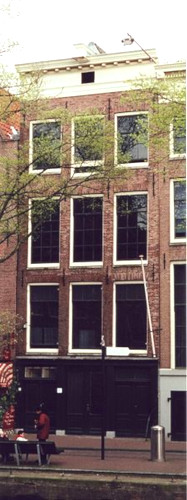 |
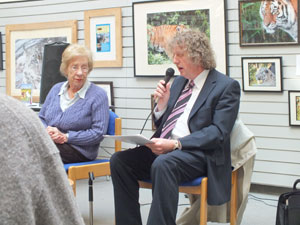 | |
| Wildlifezone exhibition Liverpool Cathedral | Anne Frank’s House Amsterdam |
Andy Mydellton Interview with Eva Schloss at Uxbridge Library |
|---|
The Wildlife Zone erected many photographic exhibitions, published many magazine feature articles, and other material whenever it was appropriate. (The Wildlife Zone is the main publishing arm for FES).
We exhibited many photo displays in libraries, schools, London galleries and other sites as far away as Liverpool Cathedral. Our themes raised awareness of FES and what they were doing. Developing from our Amsterdam visit years earlier, one of the later themes (The Survival Against the Odds) featured Anne Frank’s step sister and fellow author, Eva Schloss. Two live interviews were extremely successful: the first one was broadcast on the Wildlife Zone Programme on radio, and the second was before a large audience at Uxbridge.
.jpg) | .jpg) |
| Broadwater Lake | Broadwater |
Reserve Warden at Broadwater.
Andy Mydellton was the FES reserve warden for many years at the huge Broadwater lake run by the Wildlife Trusts. In his time he monitored the lake for birdlife and also helped plant reed beds to attract bitterns back to the area. It worked and later we heard the booming call of this scarce bird of the heron family.
The WZ also had planned walks for health benefits and experiencing nature. These included local ones near the registered office, and other in Sussex, Berkshire and Oxfordshire. These supplemented the walks and hikes on our expeditions.
Otters:monitoring
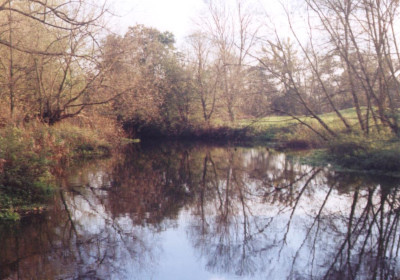
|
| Otter Holt |
FES and the WZ took part in a countrywide otter monitoring scheme and were the monitors for the River Chess. Our aim was to check the river banks for signs of otters, as well as to see them, if possible. We regularly reported our findings to the central office as well as to the Wildlife Trust. We carefully undertook our duties for some years and went on to build some otter holts.
Otter:holts
Together with other organisations we successfully built some otter holts on the River Colne in an attempt to entice these iconic animals back into this part of the county and later into London. Otters could then travel southwards, on the edge of West London to the Thames Basin where they would then increase their territory throughout the river systems. This plan was supported by many, if not all of the Home Counties conservationists.
